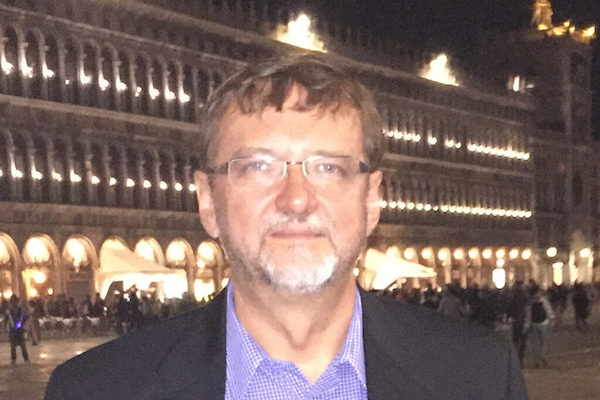BBG's Michael Meehan: human rights leaders in Russia are under unbelievable threats
BBG Watch Commentary
 Broadcasting Board of Governors (BBG) member Michael Meehan said that human rights leaders in Russia are under unbelievable threats from President Putin and his government. He promised that U.S. international broadcasters, including Radio Liberty and the Voice of America, will respond to the challenge with tough journalism. “They are fighting every which way possible and it is vitally important for us to use our collective strengths to give them the voice so they can stand up for people who don’t have voices in that country,” Meehan said.
Broadcasting Board of Governors (BBG) member Michael Meehan said that human rights leaders in Russia are under unbelievable threats from President Putin and his government. He promised that U.S. international broadcasters, including Radio Liberty and the Voice of America, will respond to the challenge with tough journalism. “They are fighting every which way possible and it is vitally important for us to use our collective strengths to give them the voice so they can stand up for people who don’t have voices in that country,” Meehan said.
Meehan and another BBG member Susan McCue visited Moscow recently and met with human rights activists and independent journalists, including some who were fired last year by the former management of Radio Free Europe / Radio Liberty (RFE/RL). Meehan described the events that led to their firing as “decisions … that did not look good upon our organization and did not look good upon our government.” Several of RFE/RL managers responsible for the firing of Radio Liberty journalists have resigned.
Three BBG members: Ambassador Victor Ashe, Susan McCue and Michael Meehan personally took charge of solving the management problem at RFE/RL after their executive staff at BBG’s International Broadcasting Bureau (IBB) failed to alert the board and to respond to the developing crisis at Radio Liberty in Russia.
The Broadcasting Board of Governors is in charge of RFE/RL and other U.S. government-funded international broadcasters which provide uncensored news to nations without free media. Meehan and McCue went to Moscow with RFE/RL’s newly appointed acting president Kevin Klose who is reforming the media organization. Some of the fired Radio Liberty journalists are being rehired. Meehan said that “we’ve turned the corner” on “sad circumstances that led to where we were.”
Meehan, McCue and Kevin Klose met in Moscow with U.S. Ambassador Michael McFaul. Meehan suggested that the U.S. State Department will work on trying to achieve the same treatment for BBG broadcasters in Russia that Russia Today journalists enjoy in the United States.
LINK TO VIDEO.
In commenting on the human rights and media situation in Russia, Meehan said:
MICHAEL MEEHAN: Seven months ago, some decisions were made that did not look good upon our organization and did not look good upon our government. I want to congratulate Kevin who came into a situation he did not create but has worked expeditiously to make many of the actors and many of the key people very comfortable with some of these choices.
We did not have to be there very long to realize how difficult the circumstance is in Moscow today, how quickly the circumstances have changed right before our very eyes. I don’t think we would have said this 18 months ago. I know that Under Secretary Sonenshine was over there on behalf of the State Department and she gave us a debrief of her trip before we left and we sort of built up some good will.
We had a chance to celebrate Russian Easter at a human rights champion Lyudmila Alexeeva’s house that Sunday and our good friend Secretary of State Kerry was with her two days later. We had a chance to sit with some of the top human rights folks in Moscow who are under unbelievable threats.
The tag of ‘foreign agent’ that Putin and his government are doing to people who are trying to speak up for human rights and the civil society is unbelievable. And these people are fearless. They are fighting every which way possible and it is vitally important for us to use our collective strengths to give them the voice so they can stand up for people who don’t have voices in that country.
It’s a big challenge and it’s important work that we’re doing.
So, I came back inspired by the commitment of our journalists, inspired by the opportunities we have to do tough journalism in hard places and the commitment of people to make things work. It was a very encouraging trip, sad circumstances that led to where we were, but I’m glad that we’ve turned the corner. I’ll keep Easter references aside, but we definitely have a new chapter underway and we need to continue to stay focused on that. It was a very productive trip.
VICTOR ASHE: You also met with the Ambassador, did you not?
MICHAEL MEEHAN: We did have a chance to go see Ambassador McFaul. We actually had a very robust conversation, which again underscored some of the disparities of how the world works on the media side. You know that Russia Today and the CCTV (Chinese state TV) can have glorious studios and all the visas they want and all the chances to do free media here in our nation’s capital, but we are not necessarily afforded similar opportunities of size and scale on the other side. He (Ambassador McFaul) has agreed, and some of our colleagues at the State Department … we’ve been talking with them about ways in which we can try to put this on the agenda of things to talk about and having some parity in terms of media coverage and journalism in each of the countries. There is some follow up that we’ve discussed with staff of things to do, but there is a willingness to join shoulders and work together on advancing our journalistic mission there.


